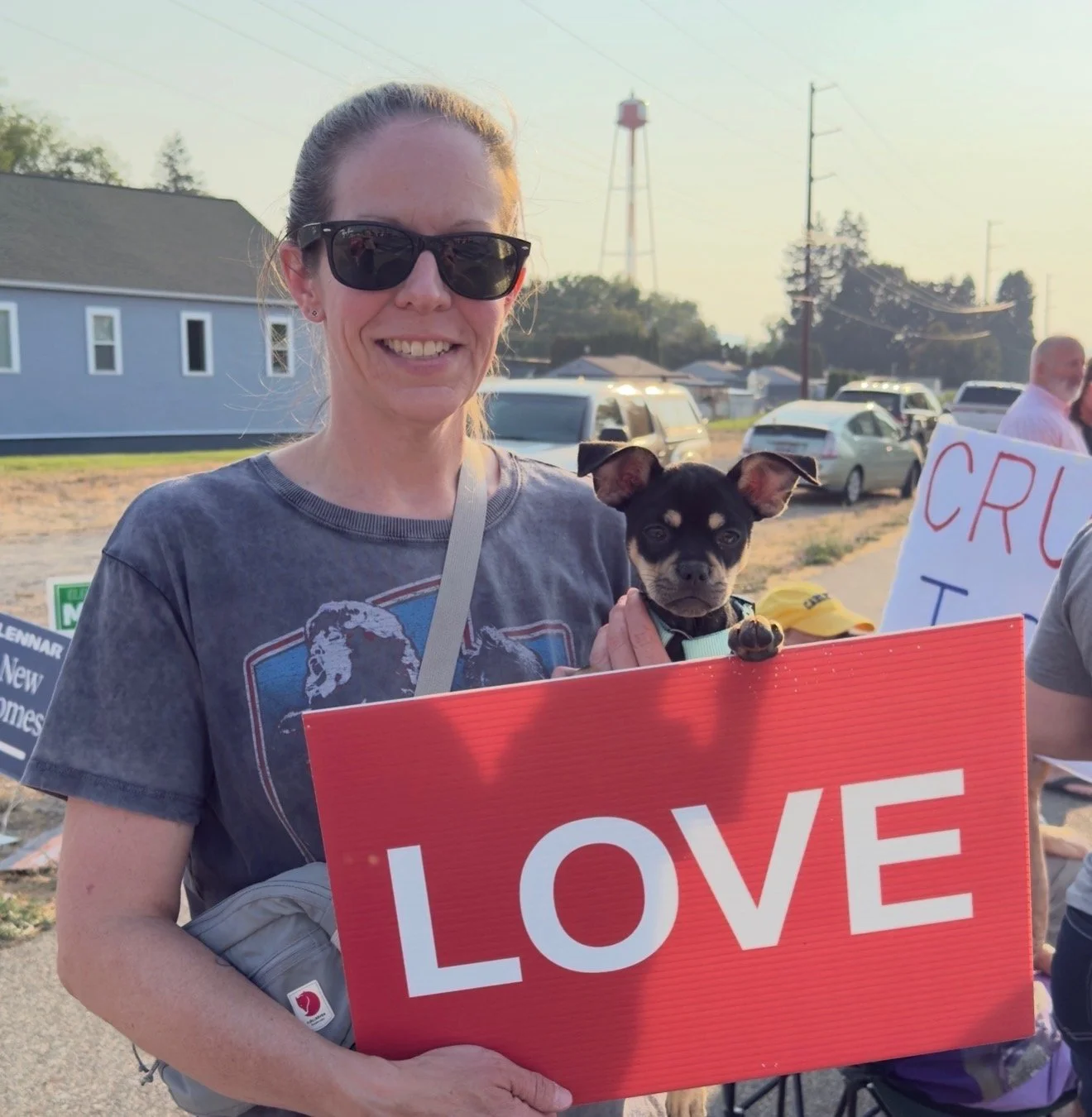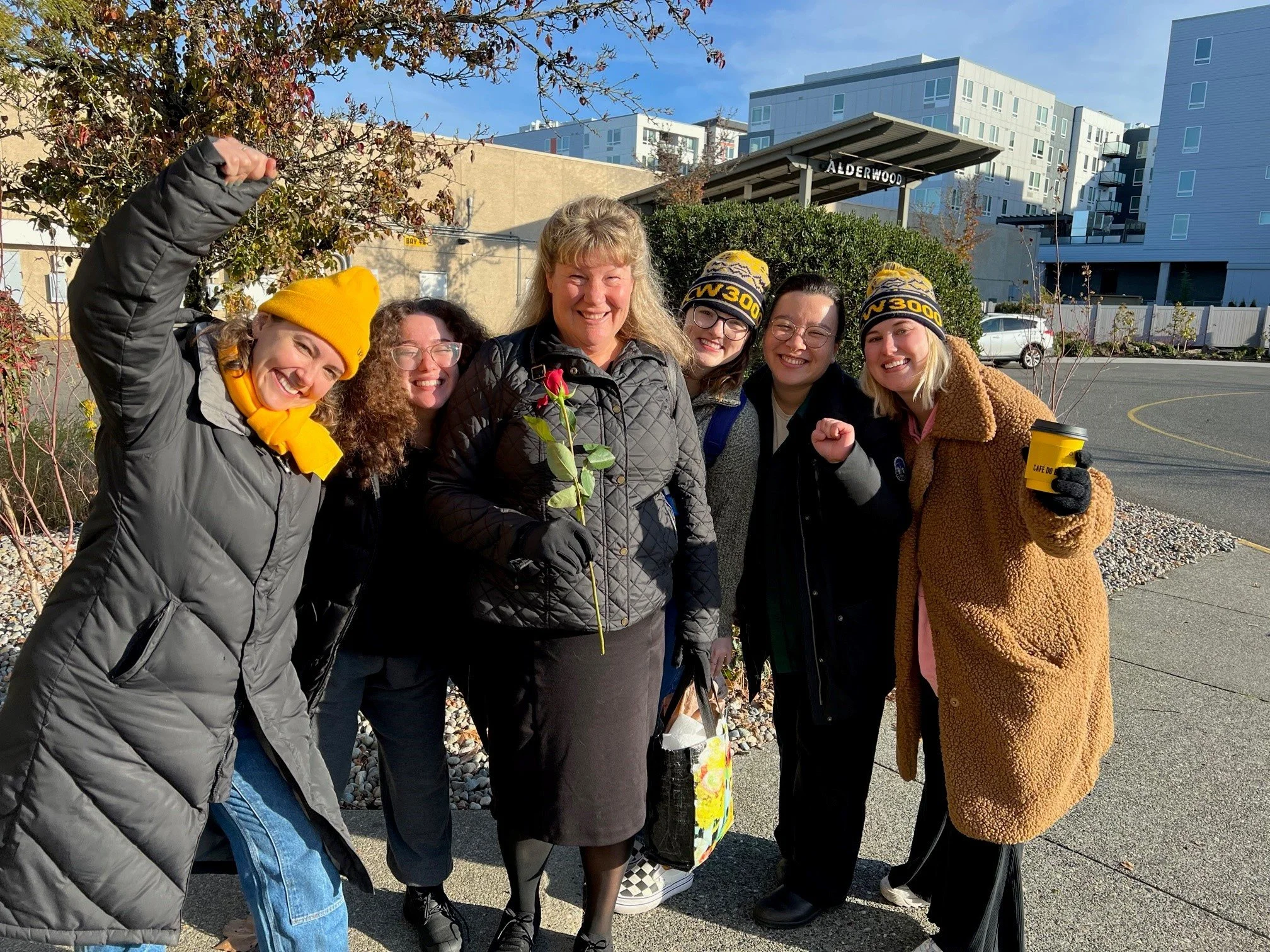Strike FAQ - UFCW 3000
Contract bargaining is a power struggle, plain and simple. We fight for what we need, like better pay, more staffing, quality health care, a reliable retirement, improved training, and more. The employer could use their revenues to meet those needs if they wanted to, but instead they fight hard to keep every dollar in their pocket. The most powerful tool we have to get what we need is the strike. Time and time again we see that credible strike threats win better contracts. That said, a workforce prepared to strike is a workforce that rarely has to. The answers in the following FAQ will help you get strike-ready. Learn your rights, prep accordingly, and we'll win a strong contract together.
"When we struck in 2024 I saw firsthand how important being prepared to strike is! When we are prepared the employer knows it, and is more likely to bargain with us ahead of any dispute." -Kimberly Schmidt, Providence Sacred Heart Nutrition Clerk
WILL I LOSE MY JOB IF I GO ON STRIKE?
There are a couple of different kinds of strikes. The employer cannot permanently replace you for participating in a valid unfair labor practice (ULP) strike. Employers can, however, permanently replace you if we strike solely for economic issues (like wages), but only after they hire a permanent replacement for your position. In both strike scenarios, our union has an opportunity to bargain over what the return to work looks like. For example, if we strike only for economic issues, then at the bargaining table we could demand the return of all workers the company replaced during the strike.
CAN I BE FIRED FOR STRIKING?
It is against the law for management to fire you because you exercise your legal right to strike, but employers may discipline strikers for misconduct during a strike (for example; violence, threats) even though the strike itself is protected.
CAN I COLLECT UNEMPLOYMENT INSURANCE ON STRIKE?
As of Jan 1, 2026, qualifying locked-out and striking workers in Washington State will be eligible to receive up to six weeks of unemployment insurance benefits. Those benefits would start 15 to 21 days after the beginning of the strike. If the workers and employer resolve the strike before that time, the state will not issue those benefits.
“If we had this law before we struck Macy’s – that would have been huge. Though our strike fund helped my coworkers feel confident about walking off the job, many asked about unemployment. If we need to picket again, now we’ll be much stronger.” - Liisa Luick, Alderwood Macy’s
WHAT IS MY STRIKE BENEFIT?
Ahead of any strike, UFCW 3000’s Executive Board approves strike benefits based on the number of hours served on the strike line. Our union also maintains a hardship fund to assist members whose families face particularly difficult financial situations. Additionally, food assistance and other financial aid may be available through community organizations and other unions. In general, it's never too early to start preparing for a strike. If you save $10 per week for 1.5 years, you'll have roughly $700 set aside. That extra cushion will help stretch UI benefits and strike pay if we strike. You can further protect yourself by notifying your creditors prior to falling behind, communicating your situation and exploring options for reduced payments or refinancing. It also helps to prioritize your expenses, placing essentials like mortgage/rent, utilities, insurance, car payments, gas, child support, and alimony at the top.
IS THERE PAPERWORK I NEED TO FILL OUT FOR MY STRIKE BENEFIT?
To receive Union Strike Benefits, workers need to complete a W9 form provided by the union.
WILL I STILL HAVE HEALTH CARE DURING THE STRIKE?
It is possible that members on strike may experience a temporary disruption to their health care. To qualify for health care under our plan, you must have reported to the Trust a minimum of 60 hours per month for single coverage and 80 hours per month for family coverage. Coverage may not be lost immediately upon striking if you met those minimum hours in the prior eligibility period (month). Members should contact the Trust for specifics on their eligibility.
DO I ACCRUE SICK LEAVE OR VACATION TIME ON STRIKE?
No.
CAN I USE ACCRUED VACATION OR PAID TIME OFF BENEFITS?
If a worker submitted a vacation request or paid time off before a strike and the employer approved it in accordance with the company’s established policies, then the employer must pay those benefits even though the approved time off occurs during a strike. Otherwise, though employers may not discriminate against strikers who request vacation time or paid time off during a strike, they’re not required to approve those requests during a strike.
HOW CAN I HELP MAKE THE STRIKE AS EFFECTIVE AS POSSIBLE?
Do not cross the picket line, and take your share of picket duty! A strike is an intensive, goal-oriented job. If you cannot attend your shift, then find someone to attend in your place.
HOW MANY WORKERS WILL IT TAKE FOR A STRIKE TO BE EFFECTIVE?
A large, active picket line is vital to a successful strike. Every member needs to participate to prevent the store from operating as usual. We will also seek help from other unions. Many unions, including our Teamsters siblings, have the right to honor our strike lines, which could prevent goods from coming into the back of the stores while we picket.
IF I AM NOT YET A MEMBER OF THE UNION BUT I AM IN THE BARGAINING UNIT, CAN I GO ON STRIKE?
Yes. All employees, even non-members and those in their probationary period, have the legal right to strike and honor the picket line.
WHAT ARE THE CONSEQUENCES OF CROSSING THE PICKET LINE?
Crossing a picket line weakens our power to win the change we need at the bargaining table. Crossing the line also erodes the camaraderie in the workplace, could prolong the strike, and it hurts our efforts to work as a team once the strike is settled. UFCW 3000 does not have a practice of fining workers for crossing the picket line.
HOW LONG WOULD A STRIKE LAST?
The duration of a strike is a strategic decision made by the bargaining team. The key to a successful strike is a united workforce and support from our allies and the customers in the community.
HOW CAN ALLIES SUPPORT?
Workers on unexpired contracts have the right to collective, concerted union activity, such as voicing support on social media and wearing buttons, stickers, or other forms of visible solidarity. Friends and family can do the same, but they must abide by the same rules of conduct expected of all bargaining unit members.
CAN I GET ANOTHER JOB DURING THE STRIKE?
You may take temporary or part-time work during a strike, but you should still participate in your assigned picket duties to remain eligible for strike benefits and to support our union’s effort.




